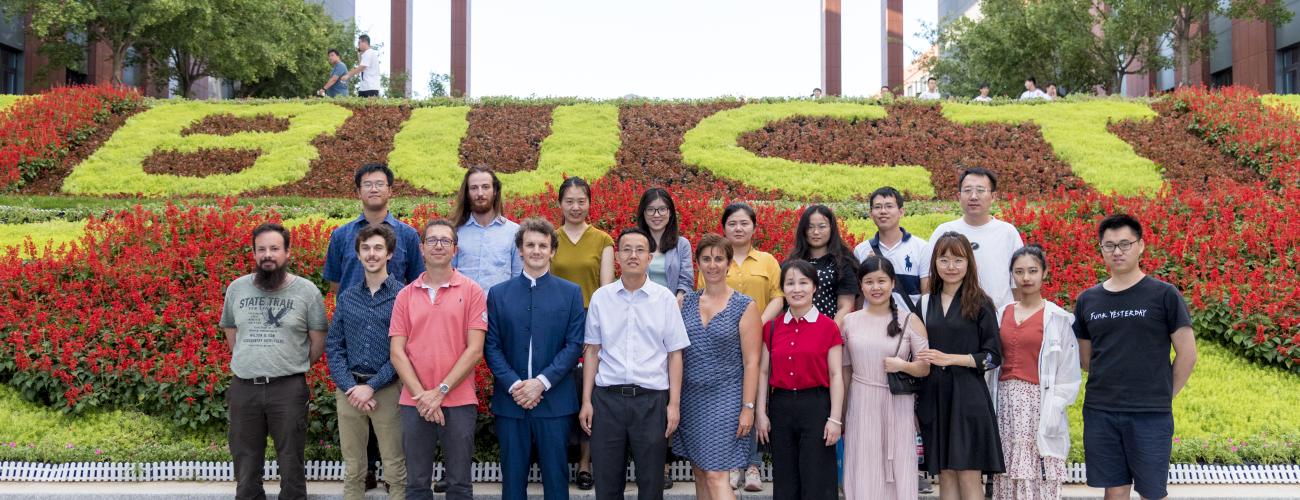
Chimie Pékin
Chimie Pékin
Sino-French Institutes in times of pandemic: Chimie Pékin
Anouk Galtayries, French Dean, and Van-Bao Ta, French Vice-Dean, manage the French-Sino Institute BUCT – Paris Curie Engineering School, also called “Chimie Pékin”, for the French side. A higher education institution, the institute results from a partnership between the Beijing University of Chemical Technology (BUCT) and a consortium of French Graduate Schools of Chemistry, members of the French Fédération Gay-Lussac (FGL), represented by Chimie ParisTech. Chimie Pékin trains its students in chemical engineering (6 year curriculum).
• How did you experience the COVID-19 crisis in China?
The crisis surprised everyone at a time when the country was preparing to celebrate Chinese New Year. The local health situation quickly deteriorated across China, and several clusters appeared in the Beijing municipality. There was a palpable tension in the city.The first days or even weeks of confinement were worthy of a science fiction movie, with streets usually crowded, turning completely empty. We experienced long moments of doubt without knowing how the spread of covid-19 would develop in China. However, the problem was quickly handled seriously by local authorities, and strict and restrictive control measures were then put in place. We felt reassured. At the end of the Chinese New Year holidays, life started to resume timidly, but we had to face the facts: it was impossible to reopen our institute on the dates originally scheduled (February 17).
• How was the crisis managed with regard to the students?
As soon as the students’ return was postponed indefinitely, we immediately informed them of the implementation of online education, starting February 10, 2020. The university supported this approach, and made all necessary tools for the proper organization of these courses available. Despite technical but also geographical constraints, our teaching staff immediately responded to adapt their training content to an online synchronous curriculum (despite the time difference for some teachers).The students were able to familiarize themselves with these new tools and these new methods, enabling them in the end not to accumulate any delay regarding the programs.
• What main tools were used?
At Chimie Pékin, the management team decided to move teaching online. One challenge we’ve faced was the time difference, because some of our academic staff are still stuck in France. Using large-scale video conferencing tools and cloud storage solutions we’ve been able to set up two types of online classes: pre-recorded video sessions, and live broadcasts. In the first case, our teachers provide students with educational resources (videos, handouts, question forms, exercises, etc.). Specific slots were then reserved to allow students to ask questions, and to do tutorials. The second solution, meanwhile, is to teach the courses live.
• Is this crisis over for you?
Sadly no, it’s a long way from being over. Yes, the situation has improved, but we’re not back to normal yet.The administrative team has returned to the premises to ensure the continued operation of the school. On the other hand, the first returns to BUCT of certain students (students in their last year of bachelor and master degrees) are only scheduled for the beginning of June, and do not yet concern our students. Online teaching and tests will therefore continue, even though our students are tangibly and understandably running out of steam.
We will also have to manage human resources issues: the return of our teachers stranded abroad (including a new recruit who does not yet have a visa), and the recruitment of new teachers (associate professors, professors for French as a foreign language - FLE) have become very difficultchallenges in a constrained international context. Nonetheless, there are also positive points. We recruited new Chinese teachers: professor of chemistry, post-doc / teaching and research assistant, coordinator and professors of FLE. Confinement or not in China and France, work did not stop: the engineering cycle (that will start next semester) is being built, the expansion of our team did not stop, and so far, we are still following our original agenda. In a nutshell, the entire management and administrative team, both French and Chinese, has adapted perfectly to this crisis. We expect it to continue for some time.
• You are already preparing for the start of the 2020 academic year: what actions are planned for welcoming students and organizing classes?
Our teams are mobilized to prepare for the next school year. We already know that this new term is going to be like no other. There will still be restrictions in place, and lots of questions remain to be answered, in particular when and how students will return, what to do about recruiting new students, when we’ll be able to open the university, when travel restrictions will be lifted, etc. On top of these challenges, we are starting our engineering cycle next September, and welcoming our first teachers on short missions from France. We will have to be very flexible and adaptable.
• What lessons / perspectives do you draw from this crisis?
Despite all the difficulties, the COVID-19 crisis has shown our ability to adapt and find ever more innovative solutions. Our management team is already used to operating remotely, so we did not specifically need time to adapt. It is indeed a great force to be present and active in the two countries simultaneously, to cover working days of 17 hours, without simultaneous holidays, teleworking smoothly with Chinese communication tools etc. This is true in normal times, and proved to be an immediately operational asset in this unexpected context.
The crisis also reaffirmed the strong will of the French schools that founded the project to pursue the development of our institute, within the framework of the FGL, ParisTech and PSL. We are all working in the same direction, and this has made us very effective. In fact, we are working for the present but also for the immediate and more distant future, health crisis or not, and it is very motivating.
To follow Chimie Pékin:
- Website: https://engineer.buct.edu.cn/

